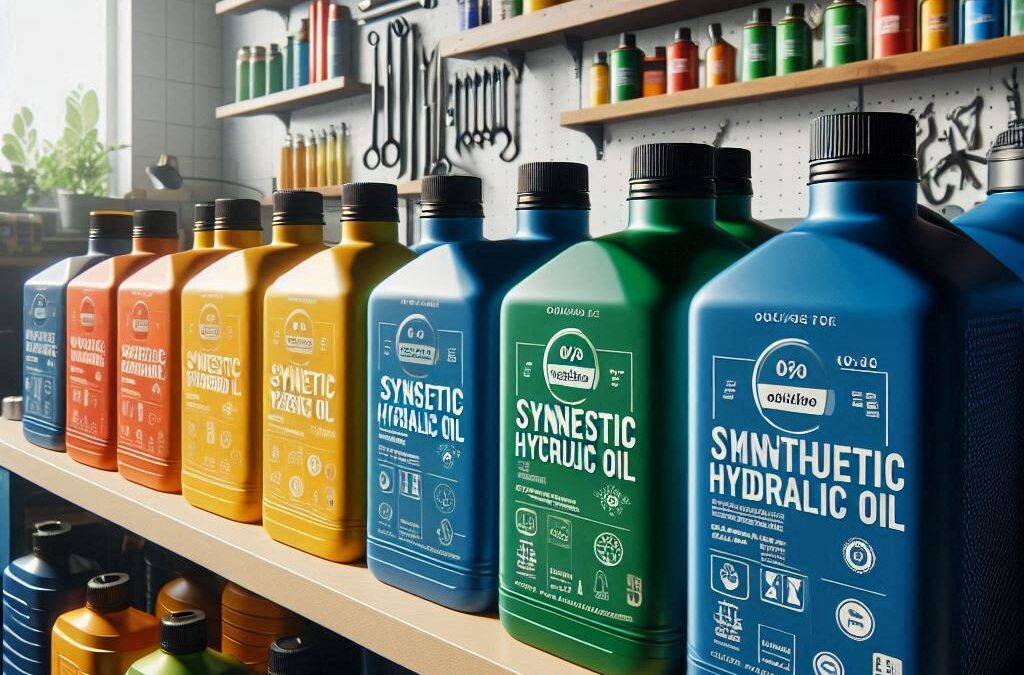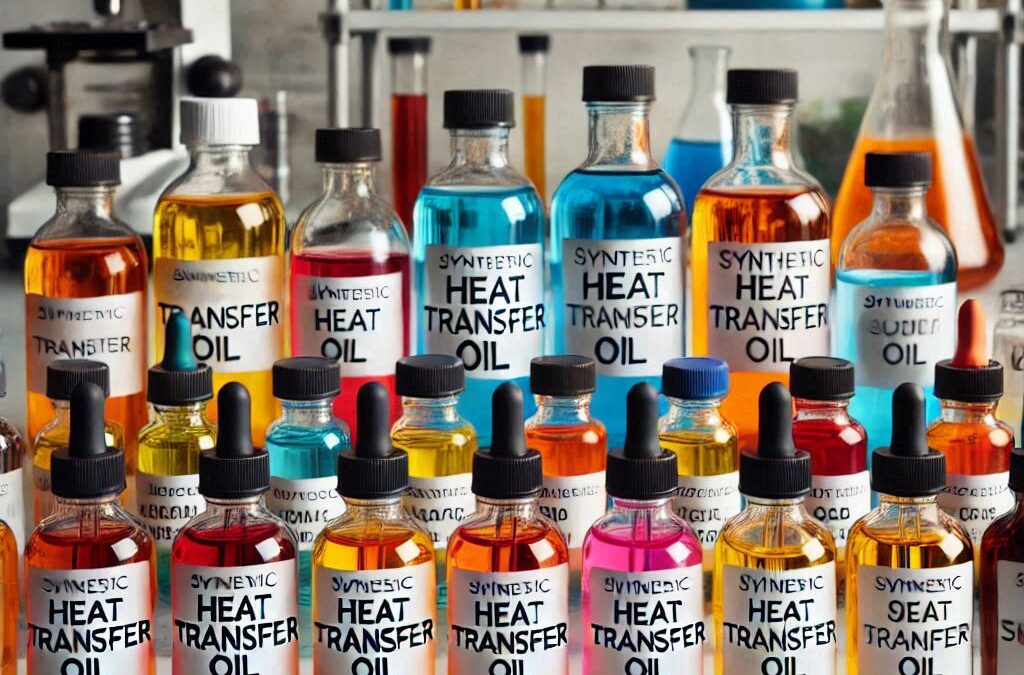
by 6k3ll | Dec 24, 2024 | Uncategorized
Synthetic hydraulic oils are advanced lubricants formulated using synthetic base oils and fortified with specialized additives. Designed to perform under conditions where mineral-based hydraulic oils fall short, synthetic hydraulic oils are ideal for applications requiring superior temperature stability, high-pressure performance, and enhanced system longevity.
Why Use Synthetic Hydraulic Oils?
Hydraulic systems demand consistent and reliable lubrication to ensure the smooth operation of moving parts, particularly under extreme conditions. Synthetic hydraulic oils are engineered to minimize wear, reduce heat buildup, and deliver long-lasting performance, making them an essential choice for modern hydraulic applications.
Key Benefits of Synthetic Hydraulic Oils:
- Extended Service Life
Synthetic hydraulic oils have a significantly longer lifespan compared to mineral oils, reducing the frequency of oil changes and overall maintenance costs.
- Superior Thermal Stability
These oils maintain optimal viscosity and performance at high operating temperatures, making them indispensable for hydraulic systems exposed to extreme heat.
- Enhanced Cleanliness
Their advanced formulations ensure cleaner lubrication, preventing sludge and deposits that can compromise system efficiency.
- Improved Water Absorption
Synthetic hydraulic oils exhibit excellent water separation properties, protecting systems from corrosion and ensuring consistent performance even in environments prone to moisture contamination.
- Resistance to Wear and Tear
With superior anti-wear additives, synthetic oils protect moving parts from friction and extend the lifespan of hydraulic components.
- Wide Operating Range
These oils remain effective across a broad temperature spectrum, making them suitable for both high-temperature and cold-start conditions.
Applications of Synthetic Hydraulic Oils
Synthetic hydraulic oils are widely used in industries and systems where demanding conditions prevail. Key applications include:
- Heavy Machinery: Excavators, cranes, loaders, and other construction equipment operating under high loads and temperatures.
- Industrial Equipment: Presses, injection molding machines, and automation systems requiring precise and reliable hydraulic performance.
- Transportation: Hydraulic systems in aircraft, marine vessels, and long-haul vehicles.
- Energy Sector: Turbine control systems, wind turbines, and power plant equipment requiring high-pressure hydraulic fluids.
- Specialized Environments: Hydraulic systems operating in extreme cold, high altitudes, or environments prone to contamination.
Why Choose Synthetic Over Mineral Hydraulic Oils?
While mineral-based hydraulic oils are sufficient for standard applications, they struggle under extreme conditions, such as high temperatures, elevated pressures, or environments requiring extended lubrication intervals. Synthetic hydraulic oils offer:
- Improved Efficiency: Enhanced lubricity ensures smoother operation and less energy loss.
- System Protection: Superior thermal and oxidative stability prevent oil breakdown and extend equipment life.
- Environmental Benefits: Cleaner lubrication reduces waste and the environmental impact of frequent oil disposal.
Leading Brands of Synthetic Hydraulic Oils
Several trusted manufacturers produce high-quality synthetic hydraulic oils tailored for various applications. Popular options include:
- Mobil DTE Series
- Shell Tellus S Series
- Castrol Hyspin Synthetic
- Total Azolla and Equivis Synthetic Range
Conclusion
Synthetic hydraulic oils are the perfect solution for hydraulic systems facing demanding conditions. Their long service life, superior temperature stability, and excellent protective properties make them a reliable and cost-effective choice for modern industrial and commercial applications. Choosing synthetic hydraulic oils ensures your hydraulic system performs at its best, with reduced downtime, lower maintenance costs, and enhanced longevity.

by 6k3ll | Dec 24, 2024 | Uncategorized
Synthetic heat transfer oils are advanced thermal fluids specially engineered to perform in demanding environments where traditional mineral-based heat transfer oils fall short. These oils are tailored to provide superior thermal stability, efficiency, and safety, making them an ideal choice for systems operating under extreme temperature conditions.
Why Choose Synthetic Heat Transfer Oils?
In industrial applications where high-performance heat transfer is essential, synthetic oils excel in ensuring system reliability and efficiency. These oils are particularly suited for closed-circuit circulation systems that do not operate under excessive pressure and where the typical bulk oil temperature is around 385°C, with a maximum film temperature of 400°C on heating surfaces.
Key Advantages:
- Long-Lasting Durability
Synthetic heat transfer oils are designed for extended service life, reducing the frequency of fluid replacement and minimizing operational downtime. This leads to significant cost savings over time.
- Superior Heat Transfer Coefficient
Their exceptional thermal conductivity ensures rapid and efficient heat transfer, enhancing system performance and reducing energy consumption.
- Energy Efficiency
By optimizing heat transfer processes, these oils lower the energy requirements of the systems they operate in, contributing to reduced operating costs.
- Outstanding Low-Temperature Fluidity
Synthetic oils retain excellent flow properties even at low temperatures, making them versatile for systems exposed to wide temperature ranges.
- Non-Corrosive Nature
Unlike some fluids that can degrade and corrode system components, synthetic heat transfer oils are formulated to remain stable and non-corrosive to most metals and alloys, even at elevated temperatures. This feature significantly extends equipment life and reduces maintenance needs.
- Safety Features
- Low Vapor Pressure: Minimizes the risk of ignition in the event of gas leakage, enhancing system safety.
- Thermal Stability: Withstands high temperatures without breaking down, ensuring consistent performance.
- Decomposition Management: Low-boiling-point decomposition products can be effectively removed from the system, preventing buildup and ensuring smooth operation.
Applications of Synthetic Heat Transfer Oils
Synthetic heat transfer oils are indispensable in industries where precise and efficient thermal management is critical, such as:
- Chemical Processing: Used in reactors, distillation columns, and heat exchangers to maintain controlled temperatures.
- Plastic and Rubber Manufacturing: Essential for molding processes, extrusion systems, and curing operations.
- Pharmaceutical Industry: Facilitates heating and cooling processes in production lines.
- Food Processing: Ensures consistent temperature control in baking, frying, and drying systems.
- Power Plants: Used in solar power systems and other energy generation setups requiring efficient thermal transfer.
Why Synthetic Over Mineral Oils?
While mineral-based heat transfer oils are suitable for many applications, they often degrade under extreme conditions, leading to reduced efficiency, increased maintenance, and higher costs. Synthetic oils, with their enhanced thermal properties and stability, provide a more reliable and economical solution for high-temperature operations.
Leading Brands of Synthetic Heat Transfer Oils
Industry leaders offer a range of synthetic heat transfer oils tailored for specific applications, ensuring you find the right product for your needs. Renowned manufacturers include:
- Dow
- Therminol®
- Shell Thermia
- Mobiltherm
Conclusion
Synthetic heat transfer oils are the backbone of thermal management in industries requiring superior performance and reliability. By investing in high-quality synthetic oils, you not only optimize system efficiency but also ensure long-term safety and sustainability. Choose synthetic heat transfer oils to elevate your system’s performance and lower operating costs.

by 6k3ll | Dec 24, 2024 | Uncategorized
Hydraulic oils are specialized fluids designed for use in power transmission systems, enhanced with carefully formulated additives to optimize performance and durability. These oils play a crucial role in the smooth operation of hydraulic systems across a wide range of industries.
Selecting the Right Hydraulic Oil
Choosing the appropriate hydraulic oil for your system requires a solid understanding of its key properties and functions. Factors such as compressibility, power transmission efficiency, air release capability, foaming resistance, viscosity, and pour point must all be considered. Additionally, understanding the roles of anti-corrosion and water-separation additives is essential for maintaining system reliability and efficiency.
The selection process also involves adhering to ISO viscosity classifications, aligning oil viscosity with equipment specifications, and considering the environmental and occupational safety standards the oil must meet. By making an informed choice, you ensure optimal system performance and longevity.
Key Applications of Hydraulic Systems
Hydraulic oils are indispensable in a variety of industries and applications, including:
- Manufacturing and Heavy Machinery: Presses, industrial robots, plastic injection molding machines, and automated systems.
- Raw Material and Infrastructure: Mining operations, bridge control mechanisms, and dam systems.
- Mobile and Transport Equipment: Excavators, cranes, construction vehicles, agricultural machinery, aircraft, ships, and long-haul trucks.
Critical Functions of Hydraulic Oils
The performance of hydraulic systems relies on several key characteristics of the oil:
- Incompressibility: Ensures efficient and instant power transmission by maintaining stable pressure.
- Air Release: Quickly separates air bubbles to preserve the fluid’s incompressibility and prevent system malfunction.
- Foam Resistance: Prevents foaming that can compromise system stability and performance.
- Optimal Viscosity: Enables smooth flow, effective lubrication, and minimizes leakage or system loss.
Leading Hydraulic Oil Brands
The market features a range of trusted hydraulic oil manufacturers known for their quality and reliability. Popular brands include:
- Shell Hydraulic Oils
- Mobil Hydraulic Oils
- Petrol Ofisi Hydraulic Oils
By selecting high-quality hydraulic oils tailored to your system’s needs, you ensure seamless operation, reduce downtime, and extend the life of your equipment. Whether for industrial, construction, or transportation use, hydraulic oils are the lifeblood of modern machinery.



